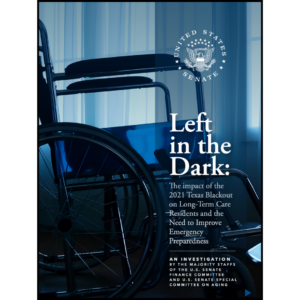In times of emergency—respond!
Those given the privilege and responsibility of providing care as well as other services to the frail and elderly are placed in a position where their actions must be clear and decisive in times of emergency. Every long-term care community is required to maintain comprehensive emergency procedures to provide staff with appropriate guidance on responding to all potential hazards, threats and perils that can occur at any given time. When an emergent event or crisis occurs, it is time to respond.
At face value, it is likely that most LTC workers don’t necessarily see themselves as “first responders” when in reality that is exactly what they are. Working with this specific workforce for many years as a fire chief as well as a life safety/disaster planning consultant, I believe that one of the biggest challenges most LTC communities face is responding to emergency situations. While a firefighter or police officer goes to work every day anticipating emergency response, the majority of the LTC facilities around the country never experience a serious crisis or disaster. When the unexpected occurs, it is essential to respond.
A common problem occurs when the “unexpected” happens and untrained staff (or insufficiently trained staff) displays a natural propensity to downplay a situation in an attempt to stay calm and not to “overreact.” A typical example of this dynamic occurs when the smell of smoke is present within a building and instead of going to the nearest red-pull station and activating the facility’s fire alarm system staff attempts to contact the maintenance director or other administrators to inquire about a potentially dangerous situation that indeed requires immediate and decisive action. This was illustrated in a fire that I responded to at a CCRC several years ago where the staff of the facility reported smelling smoke for several hours but instead of calling the fire department, they wasted time looking for the source of the smoke odor on their own. When the fire department was finally notified, we discovered a well-involved fire in a HVAC unit on the roof of the dining room that caused over $100,000 in damages and would have likely been a minor loss had the incident been properly reported to the fire department upon the initial report of smoke odor. Most notably, the occupants of the facility were placed at risk as staff failed to initiate proper emergency response procedures.
In reality, the staff of every LTC facility is placed in the unique position of caregiver and “first responder” each and every day. Whether it is a confirmed fire, tornado warning, fall, elopement, medical emergency, active shooter, mechanical failure or any other type of emergent event, staff is required by applicable regulations to be trained to respond to emergencies. To help achieve the desired level of emergency response, it is imperative to provide staff with a concise set of All-Hazard Emergency Operations Planning as well as robust training regimens that will help prepare the LTC workforce for an inevitable emergency.
LTC providers and staff must focus on the concept of being a first responder and always consider that a true emergency is potentially a moment away. Being mentally prepared to respond and understanding the importance of personal protection during an adverse event is the obligation of every LTC employee. It is the facility’s obligation to establish comprehensive procedures as well as provide regular training opportunities along with frequent drills and exercises to ensure proper response to an emergency. When in doubt, err on the side of safety and over-respond rather than under-respond.

Stan Szpytek is the president of consulting firm Fire and Life Safety, Inc., in Mesa, Arizona, and is the Life Safety/Disaster Planning Consultant for the Arizona Health Care Association and California Association of Health Facilities. Szpytek is a former deputy fire chief and fire marshal with more than 35 years of experience in life safety compliance and emergency preparedness. For more information, visit www.emallianceusa.com or email Szpytek at Firemarshal10@aol.com.
Related Articles
Topics: Disaster Preparedness , Operations











